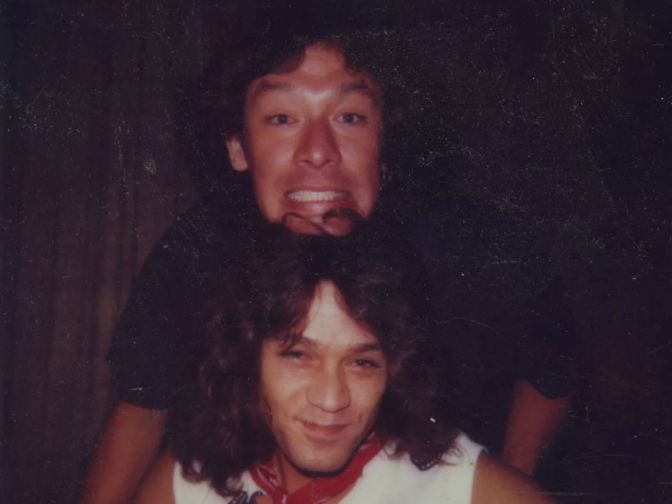When guitarist Eddie Van Halen died of cancer in 2020, his older brother Alex was overwhelmed by grief. Only 20 months apart in age, they had grown up together as "a yin and yang ... the two halves of a whole," Alex says.
Raised by a Dutch father and an Indonesian mother, the brothers immigrated to the U.S. from the Netherlands when Alex was 8 and Eddie was 6. In California, they learned to play music — mostly classical and military marches — but their focus switched to rock once they started listening to The Beatles and The Dave Clark Five. In 1974, they formed the band Van Halen, with vocalist David Lee Roth and bassist Michael Anthony.
Initially, Alex was the guitarist in the family, but he discovered that he had "no connection with the instrument," he says. "I just wasn't feeling it." His brother's link to the guitar, on the other hand, felt like fate. "The fact was, when Ed played, he made that instrument sing. It was unbelievable. [I said,] 'Ed, you're playing guitar. I want drums.' "
Known for their extravagant, high-energy performances, Van Halen would go on to produce 12 studio albums and singles that included "Runnin' with the Devil," "Hot for Teacher" and the 1983 anthem, “Jump." The band went through some famous lineup changes (mostly singers) through it's career, but Eddie and Alex are the only members of Van Halen who played on all of those albums.
In the new memoir, Brothers, Alex looks back on his relationship with Eddie and the decades they spent playing music together. "We left a lot unfinished," he says. "Obviously, every time I hear some of our music, that puts me right back there."
Interview highlights
On how Eddie Van Halen found his voice as a guitar player
He played guitar from the moment he woke up to the moment he went to sleep. And it was just his way of either communicating or finding peace with himself and the earth. … It's just that Ed had a sensitivity that was very difficult to describe. … The problem with Ed was he could play anything. So the most difficult thing for him was to find his own voice. And he spent a lot of time doing it. Then when he finally found it, that was it. Big smile.

On lighting his drum kit on fire during performances
For me, fire represents the temporariness — that only the moment counts. I mean, the flame is there and poof, it's gone. So it's life, right? So to me, that represented that. And there was an element of danger because we did it on such an amateur level. … My favorite memory of all of that was — we kind of gotten it down to a science. And as we're doing it during the performance, the lighter fluid starts to come down my arm. And then I look over and I notice my arms on fire. So I'm thinking, that can't be good, right? So I look at [my tech] Greg, who, in theory, he's there with a fire extinguisher. So I look at him and he's looking at me and he gives me the thumbs up. “Looks great, man!” I'll never forget that as long as I live.
It turns out that the average male brain does not completely mature until the age of 27. I'm still waiting.
On the This is Spinal Tap mockumentary that satirized a heavy metal band
That wasn't funny at all. Ed and I saw it and we said, “That's what we experienced!” That is really how things happen. It's mind bending. The public doesn't really have any idea what goes on behind the scenes. And I'm certainly not going to burst the bubble. But that movie, there were a lot of elements that were more true than they were parody.
On the band getting upset when Eddie did guitar on Michael Jackson’s “Beat It”
If I remember right, he did consult [us] and we said, No. ... I did want to kick his ass, because our model was basically Led Zeppelin. The way that they structured their business, the way they structured how they played, who they played with. You couldn't get you couldn't get Jimmy Page anywhere else. You can only get him on Led Zeppelin. Come to the show. That's it. You don't get in with Michael Jackson. But Ed violated that. And it started a whole cascade of bad, bad vibes.
On David Lee Roth's departure from the band in 1985
[Eddie's collaboration with Michael Jackson] really was not the single thing because things were already starting to unravel. When we named the album 1984, it had nothing to do with the year. It had to do with George Orwell and the dystopia of what was going on. This band was so fractured, we barely ever played together anymore. And unfortunately, MTV became the predominant way of conveying all this. And Dave being the visible guy naturally opted for more visual stuff. I don't blame him for any of it, but it's just too bad [because] we were on the cusp of something really, really big. … Nobody fights better than friends.








